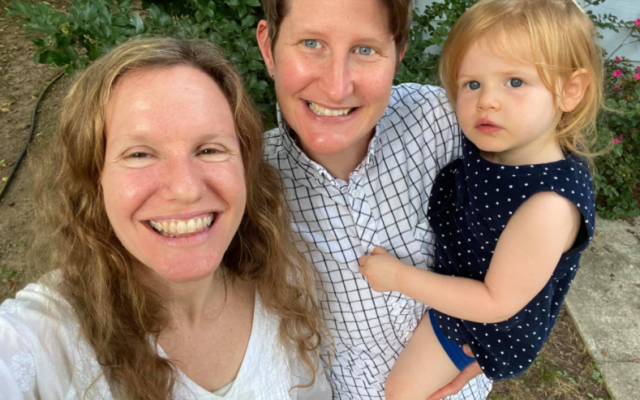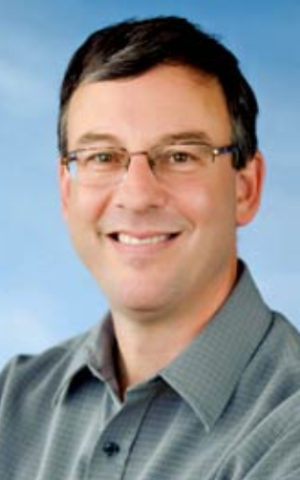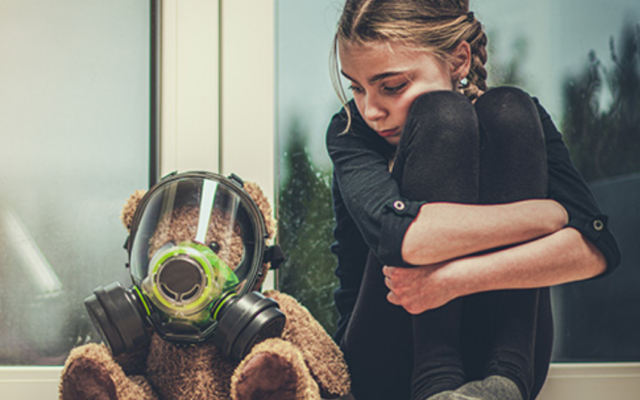COVID at Record Levels in Children
Children's hospital ICUs are full, and doctors are worried about a sudden rise in cases among the young.
When Rabbi Malka Packer-Monroe’s two-year-old daughter, Luna, first came down with a COVID infection, she found it hard to accept.
Last month, after coming home from nursery school, Luna developed a low-grade fever, lost her appetite, and became cranky. At first, Packer-Monroe thought her daughter was teething, but then she tested positive for the virus.
“I cried immediately. It was shocking and upsetting and scary. My immediate response was fear,” she said.
The rabbi, who works for 18Doors, the Jewish outreach program in Atlanta, felt she had done everything possible to keep her child safe.

She had all of her groceries delivered, avoided any indoor gatherings with her daughter, and stopped attending other children’s birthday parties. She even kept Luna away from the synagogue services the child so loved.
“She hasn’t been in a synagogue in a year and a half. That’s super heartbreaking. She loved the singing and the music and the people. And she would light up and she would squeal. And it was so delightful to bring her to High Holy Day services two years ago.”
Fortunately, her daughter’s symptoms were mild, and she recovered quickly. Luna and six other young children at her school came down with the virus after being infected by a toddler whose parents were not vaccinated. It left the rabbi shaken and angry.
“I was angry that there was a family in the school that wasn’t vaccinated and that it affected my child directly. I was angry at people in the state government who haven’t helped with this as far as mandating masks and vaccines. Just angry at this entire pandemic as a whole.”
According to Georgia public health officials, 60 percent of COVID outbreaks in the state have been in elementary and secondary schools.
Georgia’s chief epidemiologist, Cherie Drenzek, estimates that there are seven times more cases than there were during previous surges of the virus.
The number of cases, hospitalizations and deaths among school age children here has reached the highest level in recent months.
According to the American Academy of Pediatrics, COVID infections among children across the country are up “exponentially” since July. Based on data released early in September, the last two months have seen a 240% increase in cases nationally.

Dr. Howard Silverman, a pediatrician in Roswell, says his office has been inundated with phone calls from concerned parents. He and his staff are working through lunch and past their usual office hours to reassure and advise parents on what they need to do to protect their children.
“Parents want to make sure they’re doing the right things,” he said. “Should I send them to school if they have a fever and when should they be tested? When can I send them back? There’s a lot of unknowns out there.”
While young children and school-aged students are less likely than adults to become seriously ill, Silverman has seen several serious cases in his practice.
One of his patients, who is only two months old, had an infection so threatening that she had to be placed on a ventilator in a local children’s hospital. He’s concerned that the threat to child health is serious.
“I’m pessimistic right now because we’re in the midst of the worst that we’ve seen from a pediatric point of view. We’re seeing more kids in the hospital. I noticed a report from Children’s Hospital of Atlanta that their ICU was full, that they were delaying some elective surgeries because they needed space there. Other children’s hospitals in Atlanta are very full. And we’re seeing that around the country.”
Part of the problem is that a vaccine for children under 12 has not yet received government approval. Dr. Rochelle Walensky, the director of the Centers for Disease Control and Prevention in Atlanta, said earlier this month that a vaccine for children could be available by the end of the year.
On Sept. 20, Pfizer, a major manufacturer, announced studies that showed its COVID vaccine to have been safe and effective in a group of about 2,300 children from 5 to 11 years old. Moderna has told investors that its data will not be available before the end of the year.
On Sept. 19, Dr. Anthony Fauci, the government’s top infectious disease expert, told ABC’s “This Week” that a COVID vaccine for childern will “certainly” be available this fall.
“Sometime in the next few weeks, as we get into October,” he said, “we’ll be able to see the vaccine for children get enough data to be presented for safety and immunogenicity.”
In the meantime, young people who are infected can spread the disease to more vulnerable populations. Only about half of Georgia’s school districts — including those in Atlanta, Fulton, Gwinnett and DeKalb counties — mandate the wearing of masks.
Because state government leaves that decision up to local authorities, the state university system and over 120 other Georgia school districts do not have a mask mandate. It worries Dr. Harry Heiman, who runs the public health program at Georgia State University in Atlanta.
“There aren’t social distancing or other policies and interventions in place. So, in a time when we’re seeing this resurgence of COVID that raises a lot of concerns among people like me about whether or not we’re setting ourselves up for putting students, faculty and staff in situations that are not as safe as they should be.”
All of this has left Rabbi Packer-Monroe more worried than ever about her child’s future.
“I’m so nervous,” she said. “She can still get it again. We could still get breakthrough cases. So we’re still going to be just as careful and cautious and prayerful and thoughtful and intentional about what we choose to do.”
- COVID
- children
- News
- Health and Wellness
- 18 Doors
- Rabbi Malka Packer-Monroe
- Luna Packer-Monroe
- High Holy Day
- Mercy Packer-Monroe
- Nursery School
- Synagogue
- virus
- not vaccinated
- state government
- mandating masks
- Vaccines
- pandemic
- Georgia public health officials
- Outbreaks
- Elementary schools
- secondary schools
- Cherie Drenzek
- hospitalizations
- Death
- School Aged Children
- American Academy of Pediatrics
- Dr. Howard Silverman
- ventilator
- Pediatrician
- ICU
- Roswell
- Children's Hospital of Atlanta
- Atlanta
- Dr. Rochelle Walensky
- Centers for Disease Control and Prevention
- Vaccine
- Moderna
- Pfizer
- COVID Vaccine
- Dr. Anthony Fauci
- ABC’s “This Week”
- Atlanta Public Schools
- Fulton County School
- Gwinnett County Schools
- DeKalb County School District
- state university system
- Dr. Harry Heiman
- Georgia state university




comments